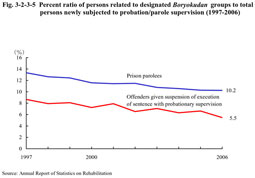| Previous Next Index Image Index Year Selection | |
|
|
3 Probation / parole supervision
Fig. 3-2-3-5 shows the percentage of probationers and parolees who are considered to have a connection with designated Boryokudan groups under the Anti-Boryokudan Act to all probationers/parolees at the time of commencement of supervision over the last 10 years.
Fig. 3-2-3-5 Percent ratio of persons related to designated Boryokudan groups to total persons newly subjected to probation/parole supervision (1997-2006) The categorized treatment system (see Part 2, Chapter 5, Section 2, 2 (2)) regards the following probationers and parolees as “persons related to Boryokudan groups”: (a) those who are leaders, members, and quasi-members of Boryokudan groups; or (b) those who previously fell under (a) above and are not considered to have completely severed ties with the groups.For those probationers and parolees in this category, efforts are made to understand the reality of their daily lives and to provide them with intensive guidance and support through the cooperation of the police and the prefectural centers for promoting the violence-expulsion movement, etc. and to encourage them to leave their crime groups and establish stable lives with decent jobs. |
